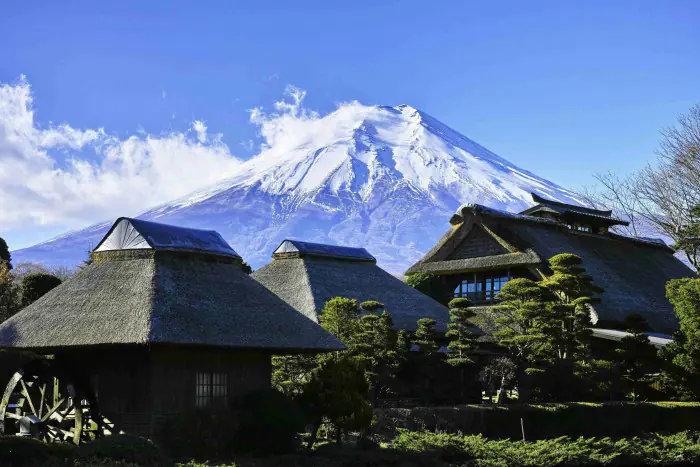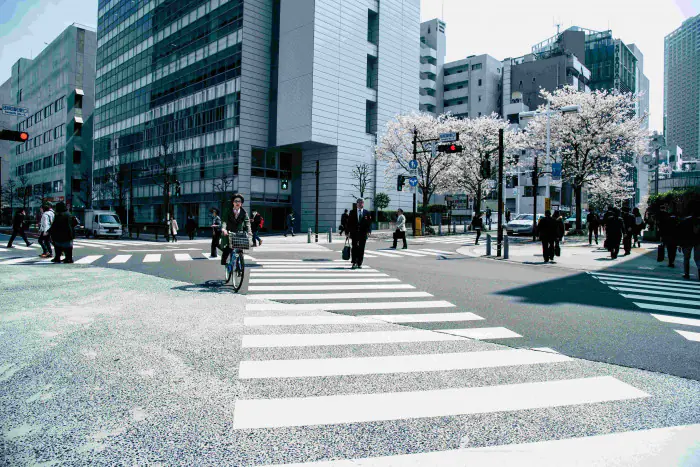country page japan
Emigrating to the Land of the Rising Sun - with UTS at your side
The fourth largest island state in the world is located in the Pacific Ocean and consists of more than 6,800 islands. Japan's capital Tokyo is located on the island of Honshu. A total of just under 126 million people live in Japan (as of 2022). For a long time, the country was isolated from the rest of the world. This has allowed it to develop its own culture with different traditions. Japan is also a major economic power with one of the most modern infrastructures in the world.
With UTS at your side, you can be sure of a smooth and professionally executed move. Thanks to our many years of expertise, we know exactly what is important in international moves. In an individual consultation, we clarify all the necessary aspects together and take your personal wishes and requirements into account.
We have created this page for all those interested in Japan. It provides a wide range of information that is important when moving to Japan. This includes entry and import regulations, tips on entering the country with animals, as well as useful information on the cost of living, rental prices and culture in Japan.
Your contact person

ALL TOPICS AT A GLANCE:
Our services
- Individual requirements
- Individual offers
- Pre-inspection
- Delivery & unpacking on site
- Dismantling, packing & loading
- Transport per truck
- Customs clearance
- Storage
- Transport insurance
Scheduling
Transfer times to Japan
- Export customs clearance in Germany: approx. 2-4 days
- Transport time by sea freight: approx. 32-37 days
- Import customs clearance in Japan: approx. 3-6 days
Note: Die Angabe der jeweiligen Transferzeiten dienen nur der groben Orientierung und sind abhängig von Verschiffungskapazitäten, Veränderungen der Zollbestimmungen des Abgangs- und Ziellandes, der aktuellen politischen Situation im Abgangs- und Zielland, der Infrastruktur des Abgangs- und Ziellandes sowie dem Vorliegen der korrekten Dokumente für die Zollabfertigung.

Entry requirements
Visa compulsory from 90 days stay
You need a valid passport to enter Japan. If your stay does not exceed 90 days, you do not need a visa if you are a German citizen. It is important that you are not gainfully employed. For long- term stays, however, a visa is required.
Good to know: No visa fees are charged for German citizens.
Applying for the Certificate of Eligibility
To apply for a visa in Japan, in most cases you will need a “Certificate of Eligibility” (CoE). This is a certificate of eligibility that is issued, for example, by your employer in Japan upon application to the Japanese immigration authorities. With the CoE and other necessary documents, you will receive your visa from the relevant Japanese diplomatic mission abroad. The processing time for the visa is approx. 3 days. It is also important that you apply for the CoE in good time, as it can take 2-3 months to be issued.
Overview of the most important long-stay visas
Work visa
There are different visa categories, including the Entertainer Visa (for artists performing in Japan), the Intra-Company Trensferee Visa (if you are transferring your company to Japan for work) and other work visas, e.g. as a researcher, professor, specialist in humanities, etc.
Student visa
For students who are studying abroad at a Japanese university.
Internship visa
If you would like to complete an internship in Japan that lasts longer than 90 days.
Spouse visa
Visa for an applicant whose spouse has been transferred to Japan on business and is accompanied by them and for those whose spouse is Japanese.
Due to the complex visa regulations in Japan, we are unable to provide more detailed information here. For further information, please contact the Embassy of Japan in Germany.
Import regulations
Customs in Japan
You should observe the following import regulations when moving to Japan:
- Obligation to declare the import and export of cash and securities of more than JPY 1 million and precious metals (gold with a purity of more than 90%) of more than 1 kg
- Prohibited: Import of weapons, ammunition, drugs, stimulants, etc.
- Strict regulations on the import of sausage and meat products
- Duty-free import: From the age of 20, three bottles of alcoholic beverages (0.76 liters each), 100 cigars, 400 cigarettes or 500g of tobacco and two ounces of perfume, goods worth up to JPY 200,000 (only goods worth more than JPY 10,000 are counted)
- The amount of cash can be imported as desired
Import of removal goods
In connection with import regulations, we recommend that you take a look at the IAM's Country Guide Japan IAM's Country Guide Japan.

Entry with animals
To Japan with the pet
It is possible to enter Japan with animals. However, there are some regulations that must be observed:
-
Microchip according to valid standards
-
Vaccination against rabies twice
-
The minimum age of the animal at the first vaccination is 91 days. There must be at least 30 days between vaccination dates. An antibody test must also be carried out.
-
After the 2nd vaccination dose you have to wait 180 days. Only then may your animal enter the country. Otherwise, there is a risk of quarantine on arrival in Japan.
-
In order to be able to react more quickly to possible complications, we recommend that you contact the quarantine service at the airport. The deadline is 40 days before arrival.
- Shortly before departure (within 10 days) a final veterinary examination must be carried out and a health certificate issued, which must be confirmed.
Pet relocation with UTS - Our tips
Anyone moving with their pet has to consider many other things in addition to the actual planning. Especially for international moves, specific regulations apply to importation and the transport must be planned in detail.
UTS organises safe and pet-friendly transport for your pet and takes care of the necessary administrative requirements. We have created a page on the subject of moving with animals with a wide variety of tips and information worth knowing.
We have some tips for taking your car to Japan:
- Importation is duty and tax free, provided it is re-exported from Japan when you move again.
- The car must not be new. A purchase invoice or registration certificate must be available, proving that the car is not new.
Notes on the driving licence
Persons not resident in Japan must have their German driving licence translated into Japanese. Together with the German driving licence and the translation, you can drive in Japan for 1 year from the date of entry.
Persons with a residence in Japan should have their driving licence converted to a Japanese driving licence no later than one year after taking up residence. The driving licence office at the respective place of residence is responsible for this. Note: An on-site eye test is required for the transfer.
You can read detailed information on the homepage of the German missions abroad in Japan.
Things to know about transport in Japan
In contrast to Germany, Japan has left-hand traffic. The maximum speed limit on the toll motorways is 80 to 100 km/h.
But you don't always need a car to get from A to B. Japan's infrastructure is modern and well developed. There are numerous bus connections, many taxis and, in the big cities, the possibility to travel by underground. In addition, Japan has a well-developed rail infrastructure.
Working in Japan
Facts & Figures
The unemployment rate in Japan is very low at 2.6 per cent (as of 2024). The average salary is just under 3,000 gross per month and varies according to gender, employment status, age and industry. As far as holidays are concerned, an employee is entitled to 10 days' holiday in the first year. This increases to up to 20 holiday days, but always depends on the company. Often there are more holiday days. Official working hours are 40 hours per week, just like in Germany. However, many Japanese work up to 15% more.

Job opportunities for foreign applicants
People with qualifications in engineering, IT, technology or the financial sector as well as in export-dependent industries have particularly good chances of finding a job. Jobs in fields such as humanities or economics require several years of professional experience and/or specific knowledge.
Note: Good to very good knowledge of Japanese is expected in many fields. It is therefore highly recommended that you study the Japanese language extensively and attend language courses if necessary.

The work culture in Japan
If you have a job in Japan, you have to be prepared for strict hierarchies and boundaries. The hierarchical order also determines, among other things, which seat you get at a meeting.
In Japan's culture, work has a high status. Many workers take only 5 days of holiday a year and often work up to 12 hours a day. Punctuality is also the be-all and end-all for the Japanese. Even if public transport has the slightest delays, this leads to unusually strong excuses, which we do not know from our culture.

Economy
A strong economic power
Japan's economy is a highly industrialised, free market economy. Japan has now emerged as the world's third largest economic power, thanks to close cooperation between government and industry, a disciplined work culture and state-of-the-art technology. Japan's most important trading partners are the USA and China.
The export of state-of-the-art technology and industrial goods are the main focus of Japan's economy. This includes machinery, electronics and means of transport. The semiconductor and pharmaceutical industries are also an important part of Japan's economy.
World-famous Japanese brands that we all know: Toyota, Sony, Fujifilm, Panasonic.
FAQ
Frequently asked questions
We have summarized some of the most frequently asked questions about formalities for you below. Your UTS relocation manager will be happy to provide you with further information at any time.
Yes, upon arrival you will need to register your new address with the immigration authorities.
The transport time by ship is about 32-37 days.
Yes, that is possible. However, you have to comply with some regulations and organise things in advance in Germany. You can read more about this in the section Entry with Animals on this page.
Especially in Tokyo, rents are high in the city centre. A one-room flat costs about €1,000. It is cheaper a little further out or in other Japanese cities.
The climatic conditions are something special. Japan stretches over 6 climate zones. The north has a cool, temperate climate, while the south is humid and subtropical.
If you have qualifications in areas such as engineering, IT, technology, the financial sector or export-dependent industries, then you have good prospects for a job in Japan.
It depends on whether you have a residence in Japan or not. Persons who are not resident in Japan must have their German driving licence translated into Japanese. Persons who are resident in Japan must have their driving licence converted into a Japanese driving licence before the end of one year.
No visa is required for entry itself. A valid passport is sufficient. If you stay longer than 90 days in the country, a visa is required.
Culture
Major cultural differences
Japanese culture is very different from the essential culture. Anyone planning a move to Japan should therefore also familiarise themselves with the culture and its peculiarities.
Japanese society places a particularly high value on the family, work and their general social position. Furthermore, Japanese culture is characterised by polite, hardworking and reserved people. The Japanese tend to avoid expressing bad feelings or complaints directly. Instead, they act quietly and calmly, which maintains harmony among themselves.
The key to finding your way around in Japan is mastering the language on a verbal level, but also understanding the characters. These can be found again and again in the most everyday situations. Nevertheless, it should be mentioned that many people in Japan speak good English, which makes it easier to communicate with each other even without knowledge of Japanese.
Invited to a Japanese restaurant? Our tips: Avoid shaking hands as a greeting. This is unusual in Japan. The Japanese also pay attention to cleanliness. Therefore, shoes are taken off directly in the entrance area.
A look into Japan's world-famous cuisine
Japan can do more than just sushi. It is not for nothing that traditional Japanese cuisine (Washoku) was named an intangible world cultural heritage by UNESCO in 2013.
The Japanese place great value on high-quality ingredients and versatile and healthy dishes. Rice, vegetables, fish and seafood often form the basis. Tofu, seaweed, soybeans, eggs and noodles are also frequently used. Care is also taken to ensure that the ingredients in the dishes retain their own flavour. For this reason, spices are only used sparingly.
Typical Japanese dishes you should try: Ramen (noodle soup), yakitori (grilled chicken skewers), miso soup (made from fish stock and soybean paste),onigiri (rice balls), tempura (deep-fried seafood or vegetables in breadcrumbs) and soba (buckwheat noodles).
Health system
The most important information about Japan's health system
The health care system in Japan is among the best in the world. However, there are some differences to Germany.
There are two health insurance systems in Japan. One is an employee health insurance scheme and the other is a national health insurance scheme. All people living in Japan are obliged to take out insurance. This also applies to those who have a visa with a duration of more than 3 months.
There is no such thing as private health insurance in Japan, as there is in Germany. The exception is possible supplementary insurance. It should also be noted that you have to pay part of the doctor's and pharmacy costs yourself. People aged 6-69, for example, pay 30%.
Good to know: General practitioners are rather rare in Japan. As a rule, each doctor specialises in a particular field. For normal health examinations, people usually turn to doctors for internal medicine.
Average rental prices
High rents in Japan's capital
If you want to rent a flat in Tokyo, you should expect high rental prices. It is cheaper a little further out. Prices in other cities are also lower in comparison. Below we have summarised the average rental prices for 6 cities in Japan (as of 2024):
Tokyo:
-
1-room flat in the city centre: approx. 1,000€
-
1-room flat outside the city centre: approx. 600€
-
3-room flat in the city centre: approx. 2.300€
-
3-room flat outside the city centre: approx. 1.300€
Osaka:
-
1-room flat in the city centre: approx. 590€
-
1-room flat outside the city centre: approx. 350€
-
3-room flat in the city centre: approx. 1.500€
-
3-room flat outside the city centre: approx. 740€
Nagoya:
-
1-room flat in the city centre: approx. 750€
-
1-room flat outside the city centre: approx. 430€
-
3-room flat in the city centre: approx. 3,000€
-
3-room flat outside the city centre: approx. 3,100€
Sapporo:
-
1-room flat in the city centre: approx. 310€
-
1-room flat outside the city centre: approx. 210€
-
3-room flat in the city centre: approx. 590€
-
3-room flat outside the city centre: approx. 420€
Fukuoka:
-
1-room flat in the city centre: approx. 470€
-
1-room flat outside the city centre: approx. 290€
-
3-room flat in the city centre: approx. 930€
-
3-room flat outside the city centre: approx. 500€
Kyoto:
-
1-room flat in the city centre: approx. 480€
-
1-room flat outside the city centre: approx. 360€
-
3-room flat in the city centre: approx. 1.200€
-
3-room flat outside the city centre: approx. 760€
Average food prices
From cheap to expensive
In Japan, you often have a wide choice of food, which can also vary greatly in price. Regional products in particular are usually cheaper. It also depends on the choice of supermarket. Nevertheless, it can be assumed that fruit is generally expensive and often costs twice as much as what one is used to.
1l milk: ca. 1,26€
500g bread: ca. 1,34€
1kg rice: ca. 3,09€
12 eggs: ca. 1,93€
1kg cheese: ca. 9,79€
1kg potatoes: ca. 2,29€

